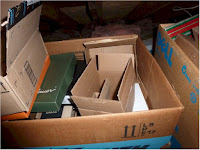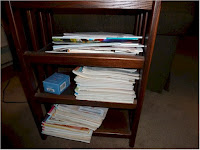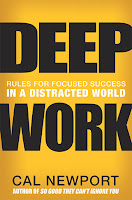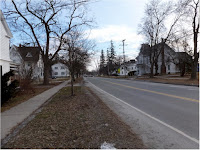

This week, we continue with our
summer read, Deep Work by Cal Newport.
Newport writes about "fragmented attention," which occurs when we are distracted, taking our attention away from work goals. Or, as he says, deep work, "
Professional activities performed in a state of distraction-free
concentration that push your cognitive capabilities to their limit.
These efforts create new value, improve your skill, and are hard to
replicate." For writers, that would be writing. Newport describes a study that "found that an interruption, even if short, delays the total time required to complete a task by a significant fraction."
He makes very clear that he believes the Internet, and social media in particular, and e-mail are the big fragmenters of attention. He quotes another writer as saying, "Twitter is crack for media addicts." He calls one subsection of a chapter of his book "The Cult of the Internet." "Cult," like "crack," rarely has good connotations. Another entire chapter is called "Quit Social Media." I think that speaks for itself.
I like the expression "fragmented attention." I think it definitely describes a real situation, the way our attention is broken by what is going on around us. In my experience, though, Internet-related activities just are not that big a fragmenter.
What's Been Fragmenting My Attention For Over Ten Years
I have definitely been suffering from fragmented attention
since the end of May. Here's what's been going on:
- A family member, who isn't well under the best of circumstances, became ill with a life-threatening condition and then suffered a stroke. She rallied.
- A sibling and I visited her skilled nursing facility daily, then slowly cut back to two to three times a week each.
- For a month or so I was reporting several times a week by e-mail to siblings on my visits. Other days, I received reports from the sibling doing the visiting.
- I e-mailed multiple cousins about their aunt's condition. (I really ought to send them an update.)
- I was involved with a cousin visit.
- Because of our family member's impaired state, one of her hearing aids ended up on the floor of her room and was destroyed. This meant contacts with her audiologist, and a trip to the audiologist's office to pick up a new hearing aid and have it synced with her other hearing aid, so I was at the snf twice that day.
- During this time, a paperwork problem came up for my family member that was totally unrelated to her condition. This involved two calls to an attorney on my part. A call and stop on my husband's part. My sister then had to meet with another attorney, and the two of us ended up going into his office.
- An out-of-state family member was in town twice this summer.
- Two other family members needed medical testing in June, and I was assisting with babysitting and rides for that. (Everything worked out, but it ended up being three consecutive days.)
- I visited another elderly family member a few times because her primary caregiver was sick.
- I caught whatever he had and was sick for two days.
- I've been shopping for both elders.
- I had to go to urgent care twice this past week for an unattractive skin infection that, thank goodness, isn't in a particularly obvious place.
- I had to drive a family member back to Vermont this weekend.
As I mentioned here last month, this kind of thing has been going on in my family, to one degree or another, over and over again, for
over ten years.
What Has NOT Been Fragmenting My Attention For Over Ten Years
I bored you with that long list describing how I've been using my time recently to make a point. Notice, please, that nowhere in the above section did you see any of the following:
- Twitter
- Facebook
- Blogging
- E-mail (Thank you, God, for e-mail for keeping family members up-to-date. Imagine having to contact one person at a time by phone or mail.)
- Social media, in general
- The Internet, in general
The kind of family issues I addressed above are not unique to me. They happen to many people in all walks of life. Add childcare to that for those with children. For writers and other creatives, add day jobs. And, yet, it's the Internet that is so often targeted as destroying our ability to work. Life problems, not so much.
Why The Internet Is So Easy To Blame
Cal Newport is not the only writer to see the Internet as a major player in distraction or work problems. There's been talk of
Internet addiction for years.
Arianna Huffington writes frequently about
our relationship with technology. (She has concerns.) Twitter and Facebook are routinely described as time wasters for writers. For everybody.
Material on managing work time while putting out fires all over your family over and over again isn't as easy to find. (Please feel free to prove me wrong with links in the comments.)
I think there's a simple reason for this: A piece of writing on managing time or work that only points out problems and offers no solutions isn't going to be terribly useful or popular. The Internet, however, is a problem with a solution. We
can grit our teeth and limit our surfing time during the workday. We
can avoid Facebook or leave Twitter. We
can schedule when we check or respond to e-mail. But most of us don't have what it takes to grit our teeth and ignore elderly, young, and ill family members.
So Is It Hopeless, Gail?
A dear family member has made it clear that my positive attitude is very possibly my worst trait. So,
of course, I don't believe those of us with unending family problems are in a hopeless situation.
I have some ideas I'm toying with while I'm using my little bits of time to write a couple of sentences now and then on my major writing project, continue my
Saving the Planet & Stuff promotion, and continue trying to submit. (I got two submissions out the week before last. Then an out-of-state family member arrived. August is another month.)
Here's something interesting I've noticed: Last summer we also had family issues here...a surgery...an elder moving...a baby arriving and landing in the NICU. I ended up not working at all for a while. I haven't had to do that so far this year. I'm not working a lot, but I'm managing to get some things done. I have some thoughts about why that's happening, too.
As always, stay tuned.

 Another library patron is waiting for The Deep by Cal Newport, so I'm going to wrap up my thoughts on the book.
Another library patron is waiting for The Deep by Cal Newport, so I'm going to wrap up my thoughts on the book.






































